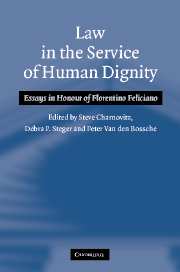Book contents
- Frontmatter
- Contents
- List of contributors
- Preface
- Biographical note
- List of abbreviations
- PART I Reflections on the contributions of Florentino Feliciano to international law
- PART II Insights into the World Trade Organization
- 5 Justice Feliciano and the WTO environmental cases: laying the foundations of a ‘constitutional jurisprudence’ with implications for developing countries
- 6 International trade law, human rights and theories of justice
- 7 Developing countries and the international trading system
- 8 North–South issues of foreign direct investments in the WTO: is there a middle-of-the-road approach?
- 9 The participation of developing countries in WTO dispute settlement and the role of the Advisory Centre on WTO Law
- 10 Reform of the WTO dispute settlement system: what to expect from the Doha Development Round?
- 11 Interpretation and Application of WTO Rules: Florentino Feliciano and the First Seven
- 12 Dispute settlement in the WTO: on the trail of a court
- 13 A proposal to introduce an Advocate General's position into WTO dispute settlement
- 14 Arbitration at the WTO: a terra incognita to be further explored
- 15 The challenges to the legitimacy of the WTO
- 16 The World Trade Organization after Cancún
- PART III The changing landscape of investment arbitration
- PART IV New challenges in international adjudication
- Bibliography of works by Florentino Feliciano
- Index
6 - International trade law, human rights and theories of justice
from PART II - Insights into the World Trade Organization
Published online by Cambridge University Press: 29 July 2009
- Frontmatter
- Contents
- List of contributors
- Preface
- Biographical note
- List of abbreviations
- PART I Reflections on the contributions of Florentino Feliciano to international law
- PART II Insights into the World Trade Organization
- 5 Justice Feliciano and the WTO environmental cases: laying the foundations of a ‘constitutional jurisprudence’ with implications for developing countries
- 6 International trade law, human rights and theories of justice
- 7 Developing countries and the international trading system
- 8 North–South issues of foreign direct investments in the WTO: is there a middle-of-the-road approach?
- 9 The participation of developing countries in WTO dispute settlement and the role of the Advisory Centre on WTO Law
- 10 Reform of the WTO dispute settlement system: what to expect from the Doha Development Round?
- 11 Interpretation and Application of WTO Rules: Florentino Feliciano and the First Seven
- 12 Dispute settlement in the WTO: on the trail of a court
- 13 A proposal to introduce an Advocate General's position into WTO dispute settlement
- 14 Arbitration at the WTO: a terra incognita to be further explored
- 15 The challenges to the legitimacy of the WTO
- 16 The World Trade Organization after Cancún
- PART III The changing landscape of investment arbitration
- PART IV New challenges in international adjudication
- Bibliography of works by Florentino Feliciano
- Index
Summary
Florentino Feliciano and I met for the first time in a symposium on the Judicial Settlement of International Disputes at the Max-Planck Institute for Comparative Public Law and International Law at Heidelberg in July 1972. As assistant of the director of the Institute, Professor Mosler, I had just published a long article on ‘The New Law of North-South Trade’ and the emerging International Development Law in the Heidelberg Journal of International Law. During the evening excursion on a riverboat down the Neckar river, I sat at the same table as Florentino and asked him about his conference intervention on why developing countries were so reluctant to submit to the jurisdiction of the International Centre for the Settlement of Investment Disputes. We engaged in a lively discussion on the difficulties of realizing ‘social justice’ through international law.
When we later met again in the World Trade Organization (WTO) where I worked as legal adviser for less-developed WTO members, the role of less-developed countries in international law (e.g., as plaintiffs or defendants in WTO dispute settlement proceedings) continued to be one of the central themes of our discussions. Should international law and the WTO legal system be perceived as a law of states, a law of peoples, or as a cosmopolitan law of individuals? Can the WTO effectively serve general citizen interests as long as WTO negotiations are one-sidedly ‘producer-driven’ and the constitutional safeguards of ‘input legitimacy’ (such as human rights, democratic procedures) and of ‘output legitimacy’ (such as promotion of general consumer welfare) are not mentioned in WTO law?
- Type
- Chapter
- Information
- Law in the Service of Human DignityEssays in Honour of Florentino Feliciano, pp. 44 - 57Publisher: Cambridge University PressPrint publication year: 2005
- 2
- Cited by



